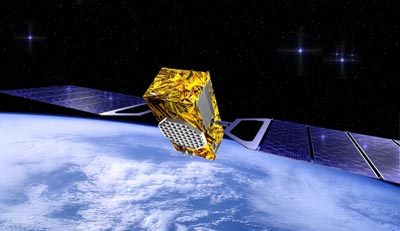The French “non”, the Dutch “nee”, and their impact on Europe’s space policyby Taylor Dinerman
|
| One of the most important building blocks of the future “Europe Puissance”, as the French call it, is a military space infrastructure that roughly duplicates the American one. |
If, over the next decade or so, the French were able to persuade their fellow Europeans to fund all these programs, they will have built for themselves a European military establishment completely independent of the US and capable, if necessary, of conducting military action against the will of the United States. Of course they don’t want to go directly against the US, but they would like to have that option. This would give Europe, under French and German leadership, the “hard power” that some politicians over there so obviously crave.
Aside from the fact that there are many other politicians and nations who have no desire to “stand up to America”, the cost of this project is huge. To effectively carry it out will cost hundreds of billions (dollars or euros). European and particularly French taxpayers are already crushed by a government that takes more than 50% of GDP. Not only is the French welfare state beginning to fall apart under the weight of unfulfillable promises, (something the US will also begin confronting the in a few years), but it is also having to bribe other European states in order to keep their vision of Superpower Europe alive.
A good example is the way that the work shares for Galileo are being handled. The UK, which might have been expected to oppose the whole program, is getting the lion’s share of the highly desirable design and manufacturing jobs. Thus French taxpayers are, to all intents and purposes, subsidizing British jobs at a time when unemployment in France has remained near or above 10% for something like two decades. The US did this sort of thing during the Cold War, but it was always difficult to justify to Congress and the beneficiaries did not always stay “bribed”.
Parts of the French citizenry have begun to notice. There was a story in Le Monde last week about angry winegrowers who have been passing around a photocopy of a story from the Miami Herald in which a junior French minister of commerce said that he would rather have people think of France as the land of Airbus rather than of wine. This sort of thing just reminds the winegrowers that they are taxed and regulated in order to subsidize Airbus (while collecting subsides themselves from the EU’s common agricultural polices) and soon may find themselves being taxed and regulated even more to support the Galileo program.
| The effect of the rejection of the EU constitution and the resulting crisis is going to force Europe’s leaders to rethink some expensive projects, including building a complete military space infrastructure. |
A few years ago we found out that inspectors and policemen were raiding the offices of French businesses in order to enforce the law that said that no one can work more than 35 hours a week. In the future, French farmers and winegrowers who wish to practice precision agriculture may find themselves being raided to make sure that they are using, and paying for, Galileo signals rather than using GPS which they can get for free. It will be interesting to see how that plays out.
The recent ESA decision to cut off relations with NASA on a proposed Mars rover program in favor of joining with Russia is a good example. In spite of obvious problems with ITAR, it is obvious that export controls were just an excuse. ESA may find that if the non-Franco-German nations of Europe begin to see it as just simply another institutional expression of anti-Americanism, then support for the space agency’s budget may diminish even further.
The effect of the rejection of the EU constitution and the resulting crisis is going to force Europe’s leaders to rethink some expensive projects, including building a complete military space infrastructure. Within a few weeks there will be a major meeting on the EU’s future budget. At that time it will become clear if the governments of Europe wish to continue to build up the EU as a superpower or if they want to concentrate their efforts on building economic prosperity and creating jobs for their peoples.
